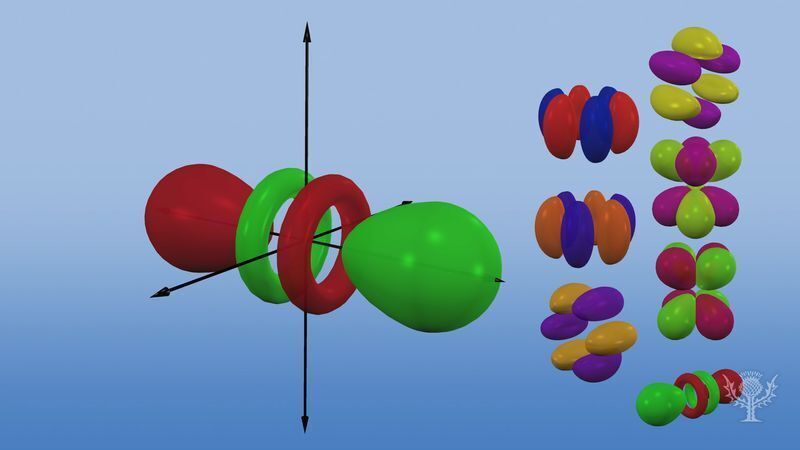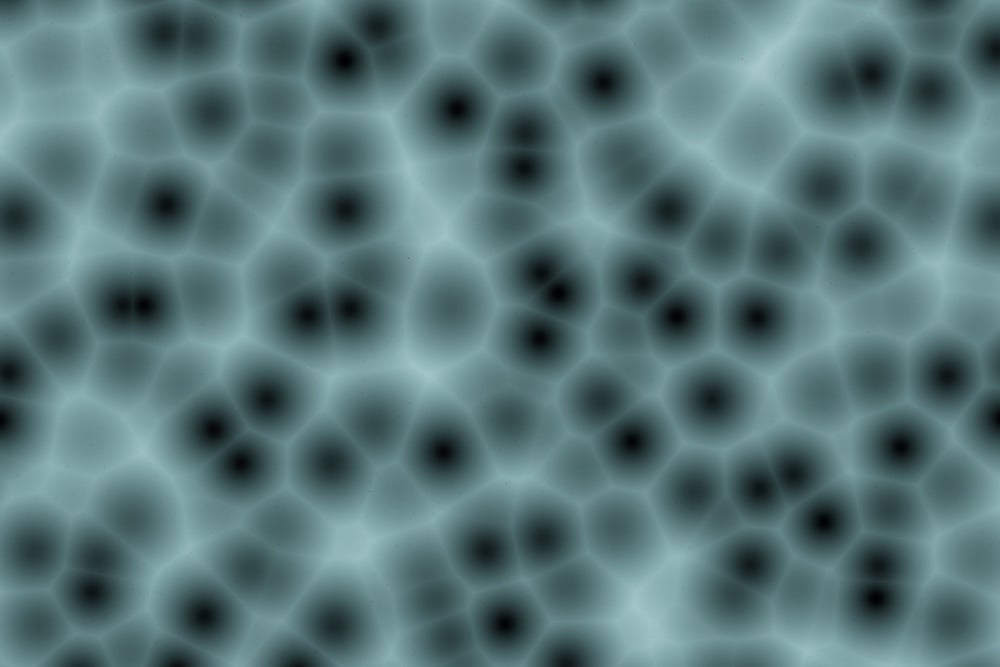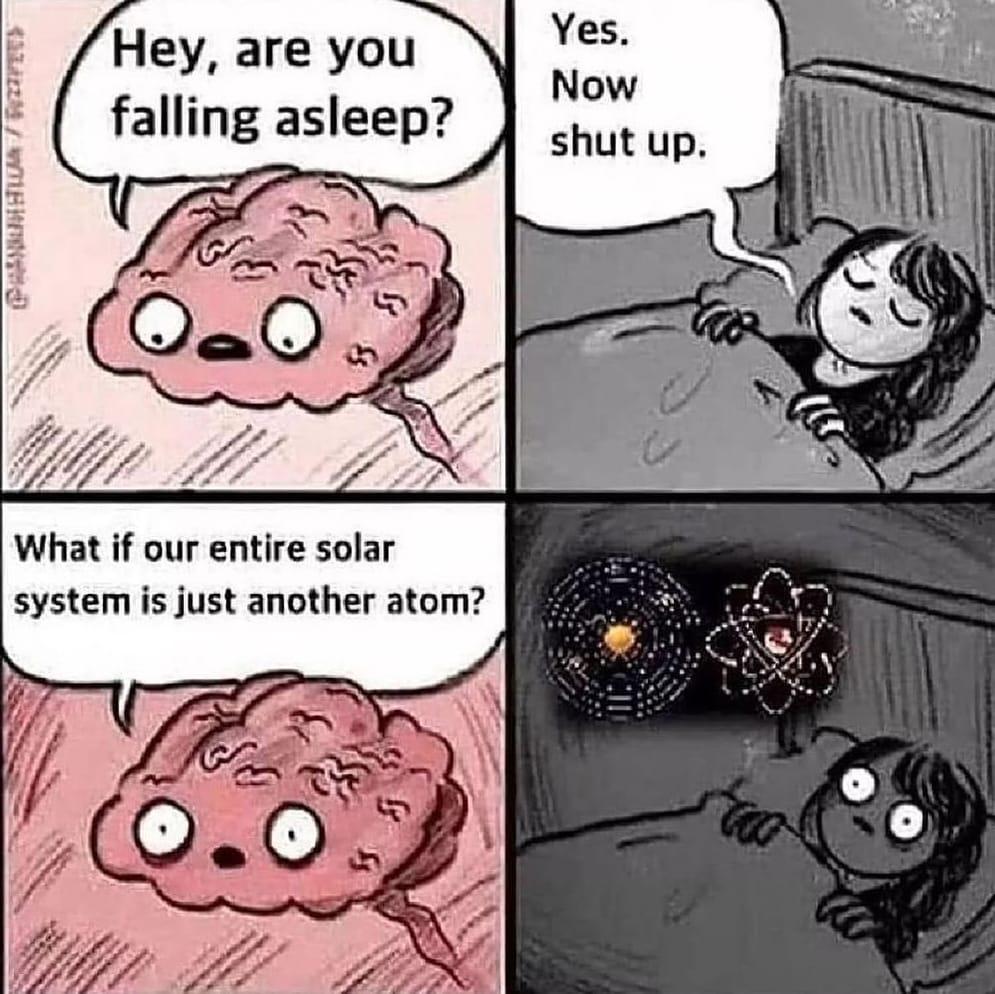The atom model with the electrons going around the nucleus, is inspired by the solar system. The better model doesn't look anything alike. This is a naturalistic circular fallacy
Science Memes
Welcome to c/science_memes @ Mander.xyz!
A place for majestic STEMLORD peacocking, as well as memes about the realities of working in a lab.

Rules
- Don't throw mud. Behave like an intellectual and remember the human.
- Keep it rooted (on topic).
- No spam.
- Infographics welcome, get schooled.
This is a science community. We use the Dawkins definition of meme.
Research Committee
Other Mander Communities
Science and Research
Biology and Life Sciences
- [email protected]
- [email protected]
- [email protected]
- [email protected]
- [email protected]
- [email protected]
- [email protected]
- [email protected]
- [email protected]
- [email protected]
- [email protected]
- [email protected]
- [email protected]
- [email protected]
- [email protected]
- [email protected]
- [email protected]
- [email protected]
- [email protected]
- [email protected]
- [email protected]
- [email protected]
- [email protected]
- [email protected]
- !reptiles and [email protected]
Physical Sciences
- [email protected]
- [email protected]
- [email protected]
- [email protected]
- [email protected]
- [email protected]
- [email protected]
- [email protected]
- [email protected]
Humanities and Social Sciences
Practical and Applied Sciences
- !exercise-and [email protected]
- [email protected]
- !self [email protected]
- [email protected]
- [email protected]
- [email protected]
Memes
Miscellaneous
If atoms were like the solar system, all of the electron orbits would lose energy and decay by emitting electromagnetic radiation.
The same type of decay does occur in the solar system as the planets emit gravitational radiation, but the decay rate is so miniscule we can't really detect it.
Electrons do orbit like planets in the solar system however they're also waves. Which is what gives the set radii they can orbit at and keeps it all stable. The orbits can and do change due to the emission or absorption of certain quanta of radiation.
So saying like is fine. It's not an exact description but more of a simile to help understanding. They do orbit like a solar system. Saying electrons orbit the same as a solar system would be incorrect. That's when the maths doesn't work and the electrons orbit would decay.
that is not what i've learned, afaik electrons do not orbit with any sort of movement, and in fact talking about positions and movements at all on such a small scale is misleading.
What i've learned is that electrons exist as a probability cloud, with a certain chance to observe them in any given position around the atom depending on the orbital and the amount of other electrons.
Comparing it to gravitational orbits is just basically entirely incorrect, and certainly isn't going to help someone pass advanced physics classes.
Yes, because everybody knows the earth is in the sun's p orbital

Nono, these are d orbitals. Although p orbitals are equally silly.
I stand corrected. I should have checked; I mean, I'm not a quantum astrophysicist.
Honestly the visual representation of the atom is just a simplified artist's rendition. It's more acceptable to treat the atom's components as charge fields filled with very high energy contained by nuclear forces. That said, the planets with molten cores and the sun also have their own electromagnetic fields so maybe the concept isn't so far off.
It would be fun to see the planets zipping around in random locations in their orbit. And if you kick one hard enough, it pops over to another orbit and emits a huge ass photon when it pops back.
Look, I'm not saying our universe exists as a node in an infinite fractal of repeating universes, but one of these is the largest structure we can see and another is the smallest:


Voroni pattern. It shows up in nature all the time.
God doesn't play dice but he sure does repeat the same tune. I believe this same pattern is observable in our brains when neurons fire is it not?
There's probably some math which explains the consistency of the pattern.
There was a guy on the net years ago who claimed that the entire universe is an electron on a plutonium atom. He made a religion out of it, wrote hymns to the atom (or, more precisely, changed the words of Christian hymns, clumsily fitting in references to plutonium atoms) and even legally changed his name to Archimedes Plutonium.
That sounds like something out of a fallout fanfiction
Or that the observable universe could be inside of a black hole. Don't watch too many black hole videos before bed.
Planet 9 is not a primordial black hole and it can't hurt you. 🙀
From my understanding of primordial black holes, if one were so close as to be in our solar system, it is very small.
Since it's so small, it would have fizzled out through hawking radiation output a long time ago.
So yes, planet 9 is NOT a black hole that can hurt you.
Now, a pocket of warped spacetime that will one day spawn a Chaos Demon? Maybe.
I thought I heard once that our universe could be a holographic projection on a 2D plane surrounding around a black hole.
Don't ask me for any details further than that, because I do not remember.
There was an episode of PBS Space Time on the holographic principle in general recently, and I believe they've also discussed the black hole thing as well.
If it's a block hole, it doesn't really matter. A black hole is not more dangerous than a planet with the same mass, it has the same gravity. The only difference is that it's much tinier. If planet 9 is a black hole, it's so small that Sun has stronger gravity (and bigger mass), meaning it's bound to rotate around the Sun the same way every other large body in the Solar system is.
Planet 9 maybe is or isn't a primordial black hole and it won't hurt you.
"well brain, it seems you really need this sleep because that makes no sense whatsoever"
The galaxy is in Orion's belt.
I had this thought as a kid. But I thought it was neat that we might be part of an atom of some larger molecule. Didn't keep me awake. I had other trauma keeping me awake, like going to school.
Considering how much shit orbits the sun that would be one wildly unstable atom
Nah. Sun just acts as the Queen Atom. Without it, you’d end up with a Helvetica Scenario. This is basic science.
This is something I find believable, and I wonder why it’s not commonly discussed more.
you have to fail intro to qm 101 and/or be stoned out of your mind to think this way
Or just reject planck length and all other dimensional limitations like it. Then you can have ~~turtles~~ universes all the way down.
Planck length is not like universal pixels. It's just where current models say there's little reason to look at smaller things, since it's kind of like worrying about which flecks of paint are coming off a car in a racing video game. It's just ... so irrelevant as to be ignorable.
It's nigh impossible to have any energy that could interact with us or atoms on the Planck length scale that wouldn't just collapse in to a black hole. It's not so much any observation of real-world pixelation, and more that even to atoms, it's very tiny.
And why is that?
planetary orbits are not quantized, for starters. atomic orbitals are occupied by pairs (at most) of electrons, and this is because of qm spin exists which has no analogue in large scale. electrons aren't spinning around on an orbit, they're more of a smudged standing wave. it's also a staple among vapid thonkers like mckenna
Here's a few reasons this doesn't work:
- Planets are different sizes, electrons are all identical
- 2 planets cannot occupy the same orbit, but (at least) two electrons with opposite spin can
- If you have a high speed planet entering the solar system, you can't transfer some of its energy to another planet and have the rogue planet continue with less energy
- All orbital energies are possible, not so much for atoms
- Planetary orbits emit gravitational waves. If electrons produced the equivalent (bremstrahlung radiation) during "orbit", they would collide with the nucleus hilariously fast. This isn't a problem because electron orbitals don't have a physical representation.
it's not commonly discussed because it's wrong
Now imagine if something... or someone... would poke our galaxy with an observation, and all the stars in the arms instantly collapsed into a single particle.
There are better manners to avoid the sleep

